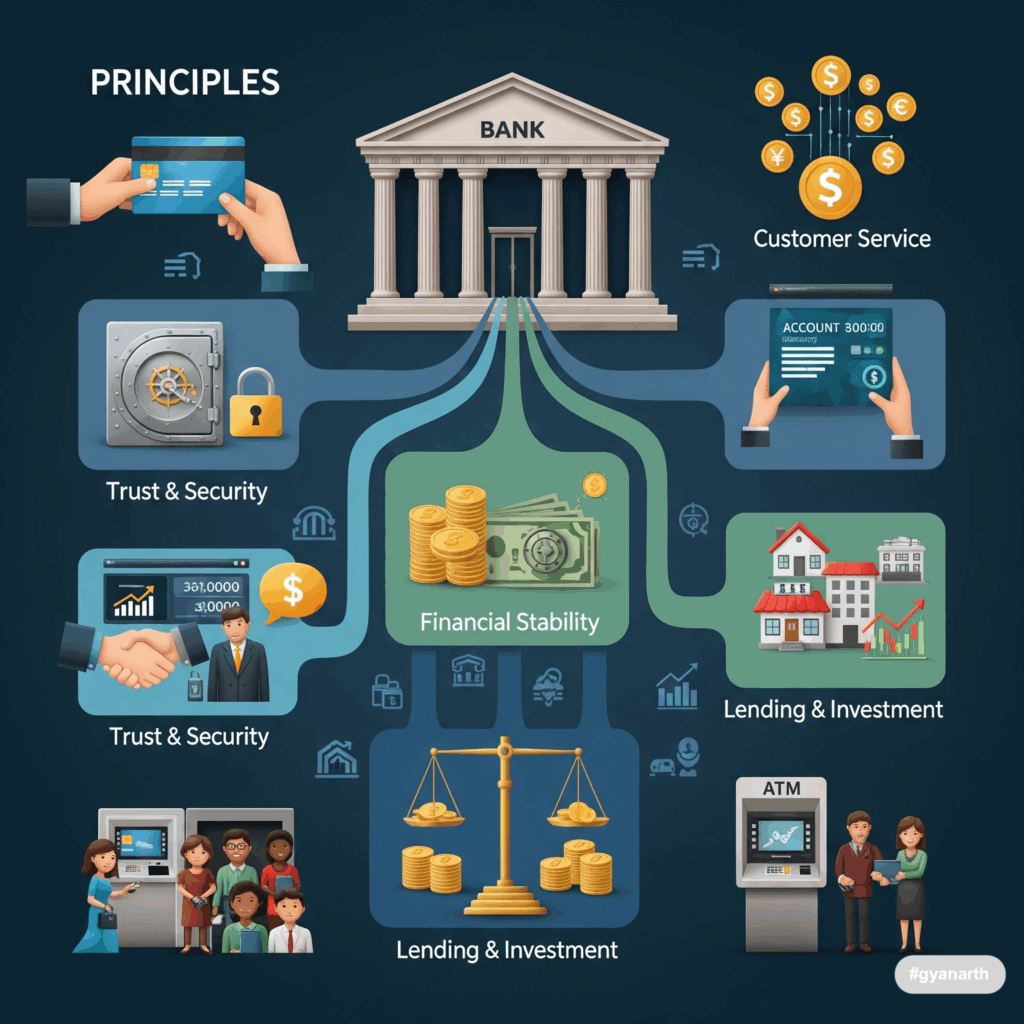Indian Economy & Indian Financial System (IE&IFS)
Module A: Indian Economic Architecture
- An overview of the Indian Economy
- Sectors of the Indian Economy
- Economic Planning in India & NITI Aayog
- Role of Priority Sector and MSME in the Indian Economy
- Infrastructure including Social Infrastructure
- Globalisation – Impact on India
- Economic Reforms
- Foreign Trade Policy, Foreign Investments and Economic Development
- International Economic Organizations (World Bank, IMF, etc.)
- Climate change and Sustainable Development Goals (SDGs)
- Issues facing the Indian Economy
Module B: Economic Concepts Related to Banking
- Fundamentals of Economics, Microeconomics, Macroeconomics and Types of Economies
- Supply and Demand
- Money Supply and Inflation
- Theories of Interest
- Business Cycles
- Monetary Policy and Fiscal Policy
- National Income and GDP Concepts
- Union Budget
Module C: Indian Financial Architecture
- Indian Financial System – An Overview
- Indian Banking Structure
- Banking Regulation Act, 1949 and its role
- Reserve Bank of India – Structure, Functions and Monetary Policy
- Credit Control and its Tools
- Development Financial Institutions (NABARD, SIDBI, etc.)
- Micro Finance Institutions
- Non-Banking Financial Companies (NBFCs)
- Insurance Companies
- Indian Financial System – Regulators and their roles
- Reforms & Developments in the Banking sector
Module D: Financial Products and Services
- Financial Markets
- Money Markets
- Capital Markets and Stock Exchanges
- Fixed Income Markets – Bonds & Debt Instruments
- Foreign Exchange Markets
- Interconnectedness of Markets and Market Dynamics
- Merchant Banking Services
- Derivatives Market
- Factoring, Forfaiting and Trade Receivables Discounting System (TReDS)
- Venture Capital
- Leasing and Hire Purchase
- Credit Rating and Credit Scoring
- Mutual Funds
- Insurance Products
- Pension Products (NPS)
- Para Banking and Financial Services provided by Banks
- Real Estate Investment Trusts (REITs)
- Infrastructure Investment Trusts (InvITs)


Principles & Practices of Banking (PPB)
Module A: General Banking Operations
- Banker-Customer Relationships
- AML Guidelines
- KYC Guidelines
- Operational Aspects of Deposit Accounts
- Operational Aspects of Handling Clearing/Collection/Cash
- Banker’s Special Relationship
- Foreign Exchange Remittance Facilities for Individuals
- Operational Aspects of NRI Business
- Foreign Currency Accounts for Residents
- Cash Management Services and its Importance
- Payment and Collection of Cheques and Other Negotiable Instruments
- Responsibility of Paying and Collecting Bank
- Ancillary Services
- Financial Inclusion & Financial Literacy
- Customer Service Guidelines
- Duties & Rights of a Banker and Customer Rights
- Grievance Redressal & RBI Integrated Ombudsman Scheme 2021
- The Consumer Protection Act, 2019
- The Right to Information Act, 2005
Module B: Functions of Banks
- Principles of Lending, Different Types of Borrowers, and Types of Credit Facilities
- Appraisal and assessment of credit facilities
- Operational Aspects of Loan Accounts
- Types of Collaterals and their characteristics
- Different modes of charging securities
- Documentation
- Non-Performing Assets (NPA)
- Important Laws Relating to Recovery of Dues
- Contracts of Indemnity, Guarantee, Bailment & Pledge
- Priority Sector Advances
- Agricultural Finance
- Finance to Micro, Small and Medium Enterprises (MSMEs)
- Government Sponsored Schemes
- Self-Help Groups
Module C: Banking Technology
- Operational Aspects of CBS Environment
- Alternate Delivery Channels – Digital Banking
- Data Communication Network
- EFT Systems
- Digital Payment Systems – NPCI
- Impact of Technology on Banking
- Security Considerations and Mitigation Measures in Banks
- Operational Aspects of Cyber Crimes/Fraud Risk Management
- Technology Trends in Banking
Module D: Ethics in Banks and Financial Institutions
Accounting & Financial Management for Bankers (AFM)
Module A: Accounting Principles and Processes
- Definition, Scope & Accounting Standards including Ind AS
- Basic Accountancy Procedures
- Maintenance of Cash/Subsidiary Books and Ledger
- Bank Reconciliation Statement
- Trial Balance, Rectification of Errors and Adjusting & Closing Entries
- Depreciation and its Accounting
- Capital and Revenue Expenditure
- Bills of Exchange
- Operational Aspects of Accounting Entries
- Back Office Functions/Handling
- Bank Audit & Inspection
Module B: Financial Statements and Core Banking Systems
- Balance Sheet Equation
- Preparation of Final Accounts
- Company Accounts – I & II
- Cash Flow & Funds Flow Statements
- Final Accounts of Banking Companies
- Core Banking Systems (CBS) and Accounting in a Computerised Environment
Module C: Financial Management
- An Overview of Financial Management
- Ratio Analysis
- Financial Mathematics – Calculation of Interest and Annuities
- Financial Mathematics – Calculation of YTM (Yield to Maturity)
- Financial Mathematics – Forex Arithmetic
- Capital Structure and Cost of Capital
- Capital Investment Decisions/Term Loans
- Equipment Leasing/Lease Financing
- Working Capital Management
- Derivatives
Module D: Taxation and Fundamentals of Costing
- Taxation: Income Tax/TDS/Deferred Tax
- Goods & Services Tax (GST)
- An Overview of Cost & Management Accounting
- Costing Methods
- Standard Costing
- Marginal Costing
- Budgets and Budgetary Control


Retail Banking & Wealth Management (RBWM)
Module A: Retail Banking
- Retail Banking: Introduction
- Retail Banking: Role within the Bank Operations
- Applicability of Retail Banking Concepts and Distinction between Retail and Corporate/Wholesale Banking
- Branch Profitability
Module B: Retail Products and Recovery
- Customer Requirements
- Product Development Process
- Credit Scoring
- Important Retail Liability Products
- Important Retail Asset Products
- Credit and Debit Cards
- Remittance Products
- Digitisation of Retail Banking Products
- Role of AI and Technology in Retail Banking
- Recovery of Retail Loans
- Management Information Systems (MIS)
- Securitisation
Module C: Support Services – Marketing of Banking Services/Products
- Marketing – An Introduction
- Delivery Channels in Retail Banking
- Delivery Models
- Customer Relationship Management (CRM) in Retail Banking
- Service Standards for Retail Banking
- Marketing Information Systems – A Longitudinal Analysis
Module D: Wealth Management
- Importance of Wealth Management
- Investment Management
- Tax Planning
- Other Financial Services provided by Banks
- Additional Reading Material on Home Loans
- Lender’s Appraisal Procedure
- Housing Finance and Tax Planning
- Mortgage Advice
- Valuation of Real Property
This detailed list should give you a clear roadmap for your preparation. Good luck!
